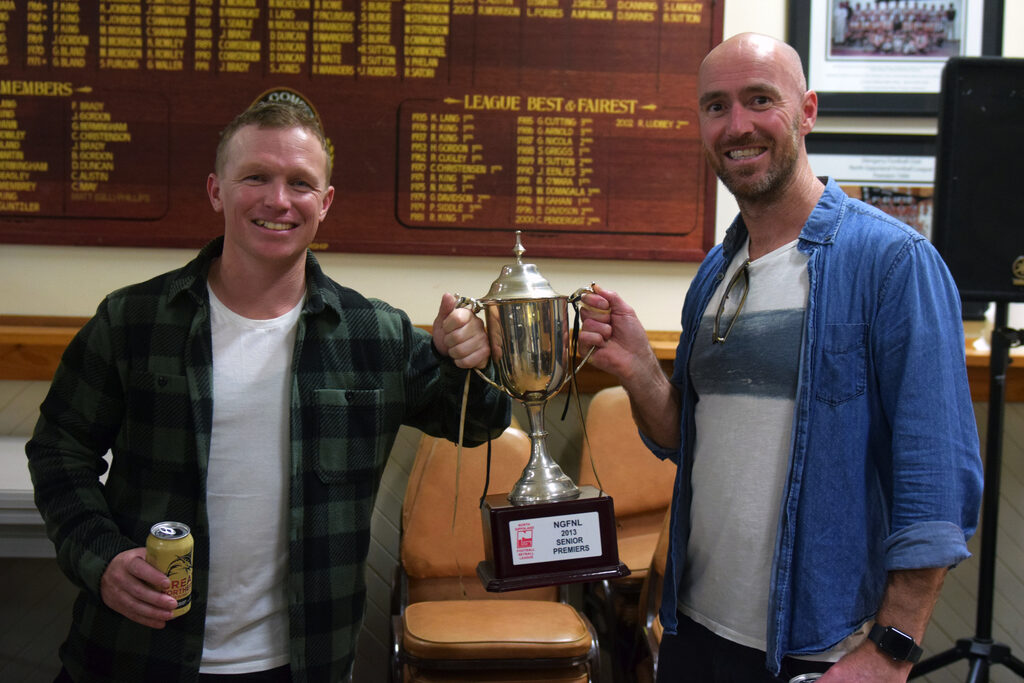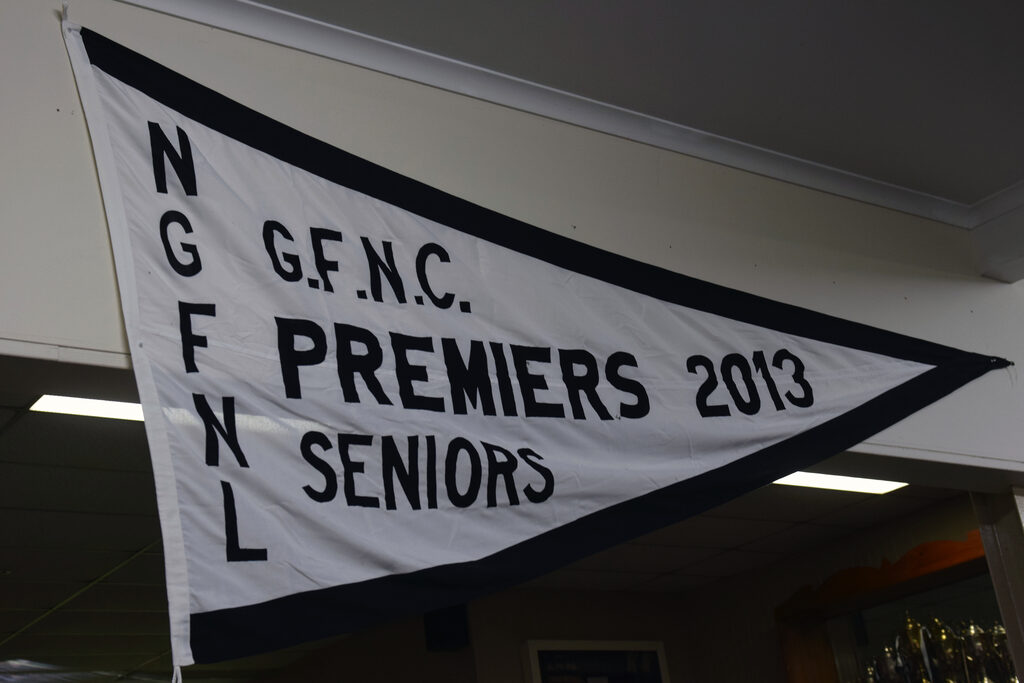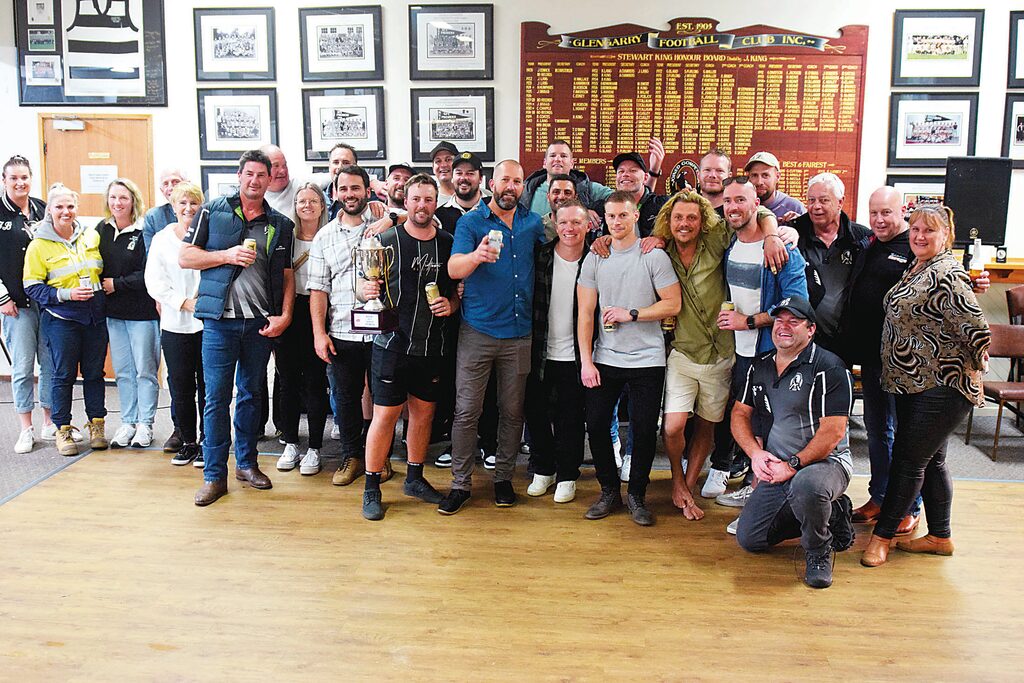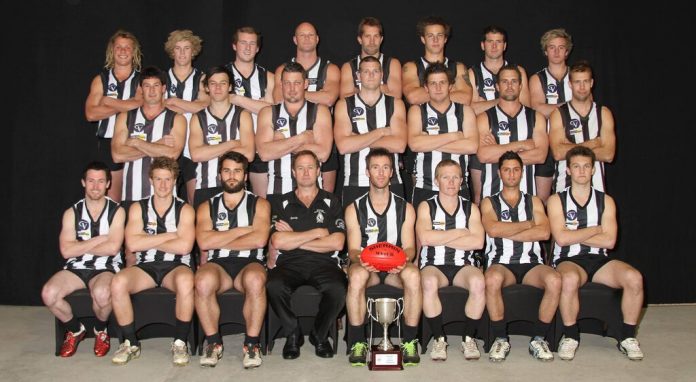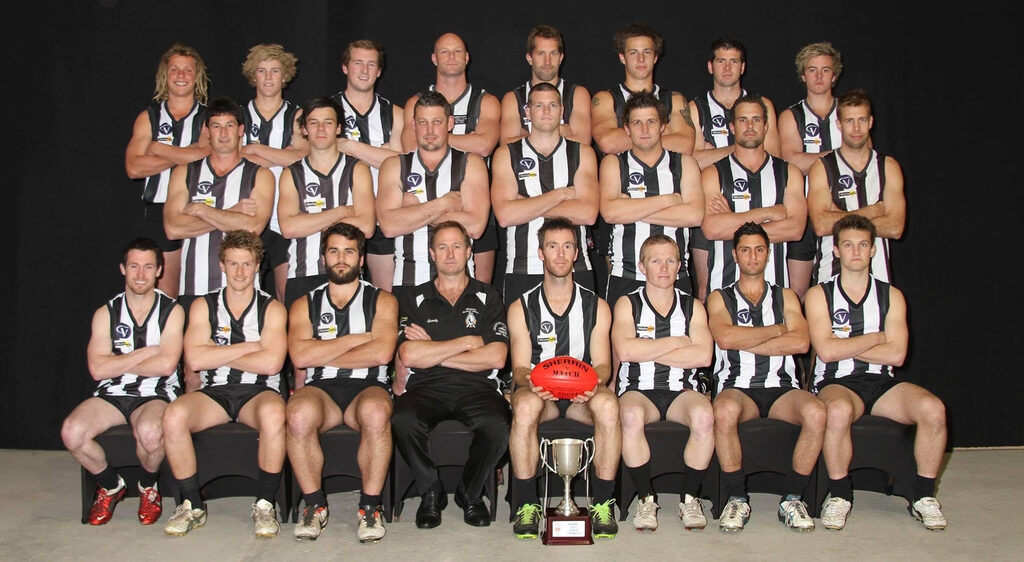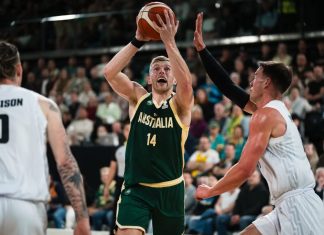LIAM DURKIN
FOOTBALL
NORTH GIPPSLAND By LIAM DURKIN WINNING a flag in regular time is so mainstream. Glengarry Football-Netball Club gathered recently to commemorate 10 years since one of the most extraordinary events ever seen in local sport. Actually, scratch that – sport in general. The 2013 North Gippsland Football-Netball League Grand Final is sure to live long in the memory of all who were present that day. On that day at Traralgon Recreation Reserve, on Saturday, September 14 2013 to be precise, the Magpies won their first premiership in 17 years, in the most truly astonishing of fashions. Just four points separated Glengarry and Heyfield at three quarter time. Nothing separated them at the end of regular time. In a dramatic finish, played out in front of a record crowd of 4400 people, the Magpies went on to win the premiership in extra time. It remains arguably the most unique and remarkable Grand Final victory in NGFNL history. Those who were there will surely never forget it. Those who weren’t surely wish they were. For the enjoyment of both however (well maybe except Heyfield supporters), this is the full story. HARD ROAD GLENGARRY hit a lot of speed bumps on the way to 2013. The Magpies made the Grand Final in 2011, and lost to Churchill by 17 points. This came a year after they bombed out in straight sets, losing the first semi final by 102 points to Rosedale. There was another early finals exit in 2012, although this time, it came in the elimination final by just five points. After going out in straight sets in 2010, losing the grand final in 2011, and losing a final by under a kick in 2012, the Glengarry Magpies could have been forgiven for thinking the Colliwobbles weren’t just confined to the AFL team. Josh King coached the team in 2010 and ’11, before his successor, Ryan Potter stepped in. Little was anyone to know the key role both men would end up playing in 2013. The transition was rather seamless, as Potter and King had played together in the SANFL for Woodville West Torrens. Potter won a flag with the Eagles in 2006, before coming to Traralgon, and further onto Glengarry “The whole reason I came to Glen was we played at Eagles together, Kingy and I always wanted to play together again, his hometown was Glen,” Potter recalled. Despite the recent shortcomings, Potter, who was best afield for the Magpies in the 2011 loss, believed the side was on the right path. “I always believed in my head we were building,” he said. “We lost in ’11, ’12 we could have gone further, we lost to Cowwarr by five points in the elimination final, I think we were the two teams having a good run that could have gone further. Cowwarr got within one point of making the prelim, if we beat them maybe we would have made the prelim. “The next year I thought it would be our year. We recruited a couple, the start was terrible, but then once it clicked we just built on it and got that confidence.” HORROR SHOW THE start to 2013 was indeed terrible for Glengarry. After the first six gams, the Magpies had a grand total of one win to their name. While a six point loss to previous year preliminary finalists Sale City in the opening round could have gone either way, there was no such narrative the next week, as Glengarry was poleaxed by reigning premier Heyfield to the tune of 89 points. The Magpies kicked just three goals in that encounter. Glengarry restored some lost pride with a gutsy 20 point win over Cowwarr, in what was an emotion charged match following the death of club legend Colin May. The effort to win that match may have drained the black and white army, as they lost their next three games to Traralgon Tyers United, Gormandale and Churchill. After the loss to Churchill by 36 points in Round 6, the Magpies sat equal last on the ladder. Imagine the odds you would have got for a Glengarry flag at that stage. With their season threatening to slip away, Potter got the Magpies together for a chat. “There was a few discussions. I sat the team down and asked them what we were doing well, what we could improve,” he said. Despite what the ladder suggested, the Magpies realised they actually weren’t that far off. Three of their five losses had been by under two goals, and they had restricted the opposition scoring to an average of three goals a quarter. The issue as far as Potter could see, was at the other end of the ground. “We kept teams low but we couldn’t score,” he said. “I was worried but Josh King was out, Kingy is big for us, our key forward. When he came back he kicked 10 against Rosedale who were top and we beat them. “We were lucky also to have Nicho (Ben Nicholson) come back and Gussy (Mark Engley). Gussy’s a key forward, he came back and kicked six, seven and nine. “Once the forward line clicked we were off and running.” TURNING POINT WITH the band back together up forward, the Magpies set about stabilising their season. Glengarry got back to business, taking care of Rosedale in Round 7, defeating the Blues 18.10 (118) to 10.11 (71). The Magpies were again staunch in defence, only letting through five goals up until three quarter time. King announced himself with 10 goals, and the following week against Woodside, he and Matt Royal kicked five each. Royal kicked 21 goals for the season playing in a variety of positions, while Ross Mcdermott nailed 38, averaging exactly two goals a game. Key forward Mark ‘Guss’ Engley slotted 54 and King 72, and from Round 7 to Round 12, the Magpies did not drop a game. From 1-5, the Magpies were all of a sudden 7-5, with a win over Heyfield among the lot. Potter could sense Glengarry was well on their way. “On-ball was good, backs were solid, once we worked out that we could kick goals and Gussy came back … Nicho (Ben Nicholson) was huge on the wing,” he said. “A few teams that beat us early, we got them back second time and beat them pretty easy. “Probably once we knocked off Rosedale and Heyfield, they were the top three, I felt we were on track.” FINALS RUN THE Magpies won four of their last six to earn a top-three finish with an 11-7 record. In what was an incredibly even NGFNL competition that year, teams two to five all ended on the same amount of points. Heyfield finished three games clear on top, while Cowwarr and Woodside were the unlucky ones to miss out, despite winning 10 games each. Churchill defeated the Kangaroos in the last round to qualify, and there was no shortage of conspiracy theories regarding the means of such a result. Nevertheless, Glengarry had qualified for the double chance, and was arguably the in-form team of the competition. The Magpies had only lost two games between mid-May and early August, one of which was by a point to Woodside in the penultimate round. This may have served as the loss Glengarry needed, as they then tuned up with a 115-point demolition of Boisdale-Briagolong the week before finals. The Magpies faced Traralgon Tyers United in the qualifying final – a team they hadn’t beaten all season. But, with form on their side, the Magpies dispatched the Bombers in a brutal exhibition, winning 11.24 (90) to 4.3 (27). Glengarry then had Heyfield to deal with for a place in the Grand Final. With their confidence up, the Magpies got the job done 18.8 (116) to 15.8 (98). Glengarry captain at the time, Dean Brooks, believed the confidence installed in the group by Potter was a key factor. “The big thing was the belief in Pottsy himself from all the boys,” he said. “He instilled so much belief in us that we could be good, we’d never felt anything like that, no one had ever played under a coach like Pottsy. “We honestly felt like we could run through a brick wall any time we went out there.” There was just one more brick wall to get through – the 2013 North Gippsland FNL Grand Final. THE BIG ONE HAVING earnt the week off, Glengarry was afforded the luxury of getting a feel for the Grand Final surface. The Magpies trained on Traralgon Recreation Reserve, before finding out they would again be opposed to Heyfield. The Kangaroos had defeated Rosedale by 20 points, giving them a chance of claiming back-to-back flags. Brooks recalls ideal weather during Grand Final week, while Potter recalled running with a theme of ‘everything matters’. A catch phrase for the Magpies was ‘don’t tell me, show me’. Heading into the match, and up against a Heyfield line-up that boasted the likes of former Hawthorn player Adrian Cox, Potter said his side had no reason to fear. “We were confident,” he said. “They might have felt we had a lucky semi but we were confident.” The Grand Final started with both sides enjoying periods of dominance. Just three points separated the combatants at quarter time, as the Magpies and Kangaroos kicked four goals each. Glengarry got on top in the second, adding five goals to one, to take a comfortable 23-point lead into the main break. Heyfield however hit back, and made the most of their opportunities in the third. The Magpies had the chance to further their lead early in the third, only for a set shot to register a behind. From that miss, the Kangaroos went down the other end, which set off a succession of six unanswered goals. In almost the blink of an eye, Heyfield had taken the lead, and were ahead by four points 11.8 (74) to 10.10 (70) at three quarter time. The final term was truly nerve-killing, although not for Potter, who struck a very calm figure amid the madness. “I was never worried … which was weird, just stick to structure,” he recalls. Seven goals were kicked, along with some handy points, and with no one really knowing how long was left, scores were deadlocked when the siren sounded to signal the end of regular time. GOING INTO O.T IN the moments immediately following players realising the match had ended in a draw, there was a period of confusion from everyone involved, even the umpires. Such was the rarity, the rule book had to be dusted off to check to see just what the protocol was. Under NGFNL rules at the time, two 10 minute halves with no time on were to be played. As Glengarry 500-gamer Trevor May remembers, there was a period of mass confusion. “There was a bit of confusion with the rules at the time, extra time, five or 10 minutes before we knew what the go was,” he said. May added another storyline to the match, having told the group he was going to retire from senior football at the end of the season. Due to idiosyncrasies associated with drawn finals, coaches weren’t allowed to address players out on the ground. Fortunately for Glengarry, Potter, as a playing-coach was able to at least have some say. Keeping his sense of humour, Cox reportedly joked “see you next week”. “You couldn’t speak to them, so lucky I was out there. I told them ‘we’ve got this, believe in yourself, you know what we do, practice this’, but you couldn’t bring them all in and huddle, we just had to go and set up,” Potter said. Understandably, with the madness of everything taken into account, extra time ended up being played with time on. Glengarry got away to a fast start in the first period of overtime, and fittingly, it was King who kicked the first goal. He was to end up with seven in a best on ground display. His seventh took the lead to 14 points, forcing some last ditch efforts from Heyfield, but the Magpies couldn’t be denied, as they won their 11th, and surely greatest, premiership. It was the Magpies’ first flag since 1996. May played in that triumph, as well as 1994, but said 2013 held a special place in Glengarry FNC history. “It’s definitely one of the top ones,” he said. “Whether it’s a club person or outside club person, the amount of people you see post-Grand Final, everyone’s spoken about it for a long time afterwards.” As for captain Brooks, feelings of being physically and mentally drained were soon forgotten when he walked onto the premiership dais. “Unbelievable, a feeling you’ve never felt before. It was a little bit of weight off the shoulders, sitting next to my brother in the rooms … pure content,” he said. “The way we did it, the way the game played out, it was taxing on everyone, because it was 10 minutes each side, so it was effectively an extra quarter, everyone was out on their feet, we were all exhausted, but when the final siren went it was relief and shortly after, the excitement was just unbelievable.” Celebrations took place in and around Glengarry, with the congregation toasting success well into the next week. For the record, the finals scoreboard read Glengarry 16.15 (111) to Heyfield 15.15 (105). Best players for the premiers were King, Potter, Chris Panayiotou, Dean Pearce, Luke Forbes (in just his seventh game for the year) and Ben Truin. Truin remains the only survivor 10 years on. CRASH LANDING HOW the mighty have fallen. What followed the euphoria surrounding Glengarry proved just how fragile football can be. The Magpies triumph became a distant memory less than 24 months later when they claimed the wooden spoon in 2015 – going through the season without even winning game. How much the premiership (and the events that led to it) took out of the Magpies might be summed up by this fact – Glengarry hasn’t won a premiership since 2013, or even played finals for that matter. The premiership defence ended with barely a whimper; the Magpies ran eighth in 2014 with a 6-12 record. While a reserves flag came in 2017 following an incredible four-week finals run (with May as captain), the Magpies endured some tough years. As is often the case when a team reaches the top, personnel changes and players coming and going can mean it is difficult to back-up. Potter, who coached for one more season before moving to Mornington, believed this is what happened to Glengarry. “We had players go to Gippsland League, had a couple go interstate and then we had a few injuries, we lost all three ruckmen, we just seemed to be unlucky,” he said. “Maybe I should have pushed harder with more recruits, but I thought we were alright but we did get a lot of injuries, I should have maybe covered the players that did leave. “Unfortunately I did feel bad after I left, we did have some struggle years. Robbie Cahill who was the best and fairest and legend of the club took over coaching, it was left in a bit of a hard spot.” As for Brooks, who was 26 at the time and played all his football at the Magpies, admitted to feeling as though there was nothing more to achieve. “Once we won that flag, I thought ‘how can we get any better?’,” he said. Brooks continued to play on-and-off after 2013, with stints at Morwell East and Traralgon and back to Glengarry. Meanwhile, their Grand Final opponents went down a struggling path of their own – albeit in entirely different circumstances. Heyfield made the Grand Final again in 2014 – and lost their only game for the season when it mattered most. The Kangaroos were there again the next two years, only to fall short on both occasions, making it four consecutive Grand Final defeats since lifting the cup in 2012. The unfortunate run of outs led some to dub it ‘The Birss Curse’, in reference to Heyfield coach at the time, Damien Birss. (Who in fairness had coached the 2012 triumph). Reflecting on 10 years since that momentous day, Potter said the memories lived on vividly. “To do it from 1-5, everyone had written us off, needing to win in extra time was very unique, it was so special,” he said. “These (reunions) are what makes footy so special, you work so hard, you win the premiership, a few hours after that siren is the best, you hang out together, it’s an amazing feeling, you can’t explain it. “To have this 10 year reunion brings it all back to celebrate how hard you worked and how great the year was.”